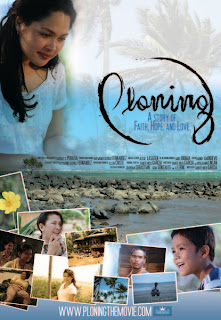Language is a window to one's culture.
Being a Linguistics student for one and a half year now I have learned the significance of our respect for, awareness and knowledge of the diversity of languages, not just in the context of preserving them but also in the notion of treating them as an important key to unlock and acquire new knowledge for humankind, discoveries and revolutionary breakthroughs that may only be accessed through language, and a descriptive perspective and understanding of it. I have also learned that behind this field of disovery one can also peek into one's unique culture that is intricately woven with language, farming rituals and medicinal herbs, dance steps and song lyrics and poems that are unique and can only be expressed through that language.
Living in the city for 18 years I have had little experience of different cultures, and reading them in books with no pictures was quite disappointing. And so as I watched Ploning (2008) I was able to peek into the beautiful island of Cuyo, Palawan and to witness a story of culture that further ignited my passion to learn about them and made me appreciate the diversity of languages in the Philippines even more.
An official entry for the Best Foreign Film Festival of the 81st Academy Awards, Ploning is both a tale and a song about a mysterious woman who hid her past, a lost man who searched for his past and a heartwarming and equally mysterious relationship all reflected through the eyes of 6-year-old Digo (Cedric Amit). Starring renowned artists Judy Ann Santos, Gina Pareno, Tony Mabesa, Eugene Domingo, Tessie Tomas, Joel Torre and Ces Quesada among others, Ploning also showcases the elegant and sophisticated style of Filipino cinema that can top international films and can make us all proud of our own creations.
The story revolves around Muo Sei (Boyong Fernandez), 30-year-old fisherman in an illegal fishing vessel, haunted by his past and a name he always calls for in his sleep every night. Advised by his Taiwanese boss he was given half a day to find "his Ploning" in his hometown in Cuyo, Palawan, and with the help of the people who once knew Ploning he was able to revisit his past, his childhood fondess for lychees, his memories with his strict brother (Lucas Agustin and Joel Torre), his questions about death and his precious hours with Ploning (Judy Ann Santos), who, he found out in the end to be his true mother.
Ploning is a geniusly sophisticated film in terms of how it unfolded the story plot: series of flashback to Digo's childhood were all beautifully knitted together and questions you would ask in the first parts were all resolved in the ending that really made me cry: why Ploning wore a white dress in his father's burial, why she never laughed and always kept her feelings to herself, why she wanted to go to Manila. These were questions that 6-year-old Digo also asked, and 25 years later was able to clearly make sense of: that his Ploning was not merely a name printed on a souvenier item in his hometown.
Crafted with outstanding cinematography, a majestic setting and interwoven with the native culture of Palawan in the form of their use of the Cuyunon language, Ploning is a critically-acclaimed film that truly helps contribute to the awareness of Filipinos about the diversity of our languages and showcase a uniqueness possessed by a culture and a language that should not be discriminated or marked as an inferior or minor aspect of a community.
According to director Dante Nico Garcia, also a Cuyunon native, the film was also a tribute to his hometown, to the people who still know how to speak Cuyunon and equally to those who have forgotten it. Such outstanding films should be widely disseminated and promoted for the benefit of the indigeneous communities to help them uplift their unique identities and make them proud of their own languages, and equally for the benefit of the present generation who have little knowledge about these cultures.





No comments:
Post a Comment